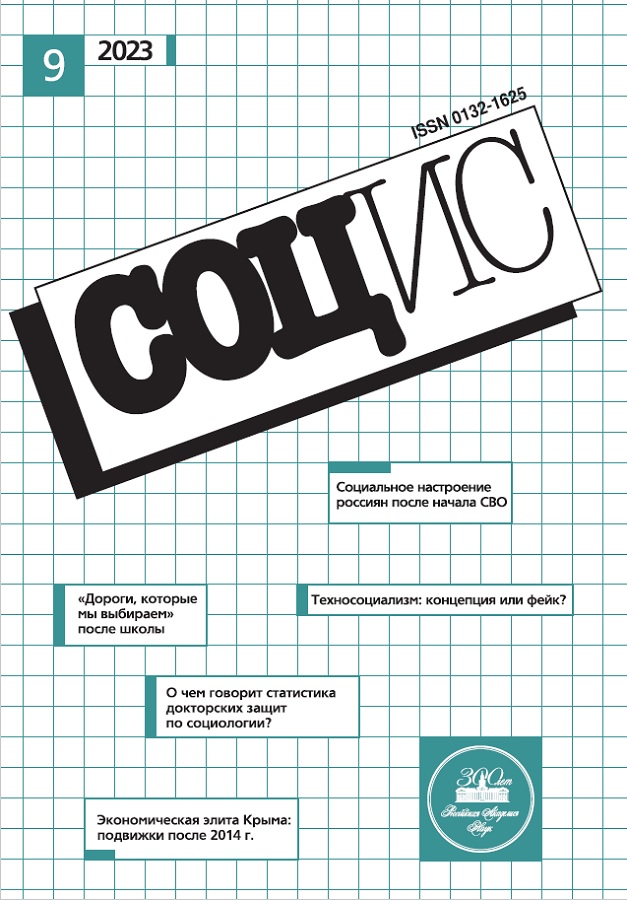Russian Citizens’ Social Mood, Its Structure and Influence on Helping Behaviour
- Authors: Mersianova I.V.1, Briukhno A.S.1
-
Affiliations:
- National Research University Higher School of Economics
- Issue: No 9 (2023)
- Pages: 29-40
- Section: Articles
- URL: https://rjmseer.com/0132-1625/article/view/661903
- DOI: https://doi.org/10.31857/S013216250027776-6
- ID: 661903
Cite item
Abstract
Social mood is a complex phenomenon that encompasses emotional and rational perceptions of economic, political and social processes by the general population, and the impact of these processes on personal well-being. Social mood is considered to be a combination of four main aspects: (1) perception of the political, economic and social situation in the country; (2) general emotional state; (3) degree of optimism; (4) generalized trust and willingness to unite. Based on the data of an all-Russian survey conducted in 2022 by the Center for the Study of Civil Society and the Non-Profit Sector at the HSE University (Moscow, Russia), it was revealed that overall positive social mood prevails in the modern Russian society. Cluster analysis revealed six groups that differ from each other in terms of the four of social mood aspects listed above. The data show a statistically significant connection between social mood and participation in volunteering and informal helping behavior. In particular, respondents who demonstrate a greater willingness to unite and higher levels of trust are generally more likely to participate in helping behavior, although a pessimistic attitude is associated with significantly less involvement regardless of declared willingness to unite. Meanwhile, respondents exhibiting optimistic perceptions of their future are more likely to participate in helping others irrespective of trust and willingness to unite.
Keywords
About the authors
Irina V. Mersianova
National Research University Higher School of EconomicsRussian Federation, Moscow
Aleksandra S. Briukhno
National Research University Higher School of EconomicsRussian Federation, Moscow
References
- Балацкий Е.В., Екимова Н.А. Эффект инерции в формировании социальных настроений // Мониторинг общественного мнения: экономические и социальные перемены. 2007. №. 3 (83). С. 85–94.
- Боченкова Н.А. Социальное настроение и его влияние на поведение населения // Социальная политика и социология. 2014. Т. 2. № 1 (102). С. 199–212.
- Боченкова Н.А. Социальное настроение россиян в современных социально-экономических условиях // Вестник университета. 2012. № 13–1. С. 213–218.
- Васильева О.В. Социальное настроение как генеральный индикатор позиции социального субъекта в обществе // Актуальные вопросы общественных наук: социология, политология, философия, история. 2017. № 1–2 (61). С. 48–55.
- Васильева О.В. Социологическое измерение социального настроения. Постнеклассический подход // Управление устойчивым развитием. 2019. № 5. С. 53–60.
- Каминский В.С. Социальное настроение жителей Вологодской области в условиях экономического кризиса // Социологическая наука и социальная практика. 2016. Т. 4. № 2 (14). С. 21–39.
- Каминский В.С. Социальное самочувствие населения Вологодской области в 2010-2015 гг. // Вестник Пермского университета. Философия. Психология. Социология. 2016a. № 1. С. 136–147.
- Кученкова А.В. Социальное самочувствие и субъективное благополучие: соотношение понятий и способов измерения // Вестник РГГУ. Сер. «Философия. Социология. Искусствоведение». 2016. № 2 (4). С. 118–127.
- Лушникова О.Л. Социальные настроения жителей монотерриторий Хакасии // Вестник Пермского университета. Философия. Психология. Социология. 2022. № 1. С. 173–183.
- Михайлова Л.И. Социальное самочувствие и восприятие будущего россиянами // Социологические исследования. 2010. №. 3. С. 45–49.
- Морев М.В., Каминский В.С. Методологические особенности изучения социальных настроений на региональном уровне // Проблемы развития территории. 2013. Т. 5. № 67. С. 96–103.
- Морев М.В., Каминский В.С. Социальное настроение: факторы формирования и территориальные особенности // Проблемы развития территории. 2014. Т. 4. № 4. С. 48–66.
- Назаров М.М., Кублицкая Е.А. Социальные настроения в столичном мегаполисе: результаты сравнительного анализа // Наука. Культура. Общество. 2016. № 1. С. 171–188.
- Саксудаева С.О. Основные характеристики социального настроения молодежи (на примере республики Бурятия) // Вестник Бурятского госуниверситета. Философия. 2009. № 6. С. 190–193.
- Тихонова Е.В. Социальное настроение как индикатор восприятия населением социальной действительности // Материалы Афанасьевских чтений. 2016. № 3 (16). С. 12–16.
- Тощенко Ж.Т. Социальное настроение – феномен современной социологической теории и практики // Социологические исследования. 1998. № 1. С. 21–34.
- Харченко С.В. Феномен и природа социального настроения // Мир науки, культуры, образования. 2011. № 1. С. 168–170.
- Черепанова М.И., Горбунова А.А., Сарыглар С.А. Социальное самочувствие населения как индикатор безопасноси и доверия в Алтайском крае // Society and Security Insights. 2020. Т. 3. №. 1. С. 90–101.
- Conceição P., Bandura R. Measuring subjective wellbeing: A summary review of the literature // United Nations development programme (UNDP) development studies, working paper. 2008.
- Diener E. Subjective well-being // Psychological bulletin. 1984. Vol. 95. No. 3. Р. 542–575.
Supplementary files










